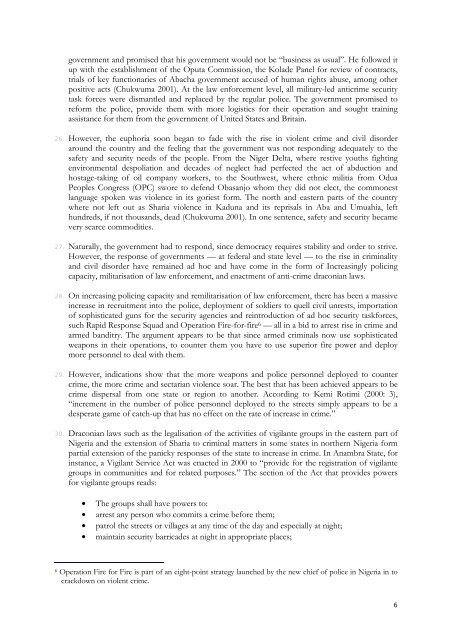114 - Nigeria - Crime and Human Rights Shettima, Kole - The ICHRP
114 - Nigeria - Crime and Human Rights Shettima, Kole - The ICHRP
114 - Nigeria - Crime and Human Rights Shettima, Kole - The ICHRP
Create successful ePaper yourself
Turn your PDF publications into a flip-book with our unique Google optimized e-Paper software.
government <strong>and</strong> promised that his government would not be “business as usual”. He followed it<br />
up with the establishment of the Oputa Commission, the Kolade Panel for review of contracts,<br />
trials of key functionaries of Abacha government accused of human rights abuse, among other<br />
positive acts (Chukwuma 2001). At the law enforcement level, all military-led anticrime security<br />
task forces were dismantled <strong>and</strong> replaced by the regular police. <strong>The</strong> government promised to<br />
reform the police, provide them with more logistics for their operation <strong>and</strong> sought training<br />
assistance for them from the government of United States <strong>and</strong> Britain.<br />
26. However, the euphoria soon began to fade with the rise in violent crime <strong>and</strong> civil disorder<br />
around the country <strong>and</strong> the feeling that the government was not responding adequately to the<br />
safety <strong>and</strong> security needs of the people. From the Niger Delta, where restive youths fighting<br />
environmental despoliation <strong>and</strong> decades of neglect had perfected the act of abduction <strong>and</strong><br />
hostage-taking of oil company workers, to the Southwest, where ethnic militia from Odua<br />
Peoples Congress (OPC) swore to defend Obasanjo whom they did not elect, the commonest<br />
language spoken was violence in its goriest form. <strong>The</strong> north <strong>and</strong> eastern parts of the country<br />
where not left out as Sharia violence in Kaduna <strong>and</strong> its reprisals in Aba <strong>and</strong> Umuahia, left<br />
hundreds, if not thous<strong>and</strong>s, dead (Chukwuma 2001). In one sentence, safety <strong>and</strong> security became<br />
very scarce commodities.<br />
27. Naturally, the government had to respond, since democracy requires stability <strong>and</strong> order to strive.<br />
However, the response of governments — at federal <strong>and</strong> state level — to the rise in criminality<br />
<strong>and</strong> civil disorder have remained ad hoc <strong>and</strong> have come in the form of Increasingly policing<br />
capacity, militarisation of law enforcement, <strong>and</strong> enactment of anti-crime draconian laws.<br />
28. On increasing policing capacity <strong>and</strong> remilitarisation of law enforcement, there has been a massive<br />
increase in recruitment into the police, deployment of soldiers to quell civil unrests, importation<br />
of sophisticated guns for the security agencies <strong>and</strong> reintroduction of ad hoc security taskforces,<br />
such Rapid Response Squad <strong>and</strong> Operation Fire-for-fire 6 — all in a bid to arrest rise in crime <strong>and</strong><br />
armed b<strong>and</strong>itry. <strong>The</strong> argument appears to be that since armed criminals now use sophisticated<br />
weapons in their operations, to counter them you have to use superior fire power <strong>and</strong> deploy<br />
more personnel to deal with them.<br />
29. However, indications show that the more weapons <strong>and</strong> police personnel deployed to counter<br />
crime, the more crime <strong>and</strong> sectarian violence soar. <strong>The</strong> best that has been achieved appears to be<br />
crime dispersal from one state or region to another. According to Kemi Rotimi (2000: 3),<br />
“increment in the number of police personnel deployed to the streets simply appears to be a<br />
desperate game of catch-up that has no effect on the rate of increase in crime.”<br />
30. Draconian laws such as the legalisation of the activities of vigilante groups in the eastern part of<br />
<strong>Nigeria</strong> <strong>and</strong> the extension of Sharia to criminal matters in some states in northern <strong>Nigeria</strong> form<br />
partial extension of the panicky responses of the state to increase in crime. In Anambra State, for<br />
instance, a Vigilant Service Act was enacted in 2000 to “provide for the registration of vigilante<br />
groups in communities <strong>and</strong> for related purposes.” <strong>The</strong> section of the Act that provides powers<br />
for vigilante groups reads:<br />
• <strong>The</strong> groups shall have powers to:<br />
• arrest any person who commits a crime before them;<br />
• patrol the streets or villages at any time of the day <strong>and</strong> especially at night;<br />
• maintain security barricades at night in appropriate places;<br />
6 Operation Fire for Fire is part of an eight-point strategy launched by the new chief of police in <strong>Nigeria</strong> in to<br />
crackdown on violent crime.<br />
6
















